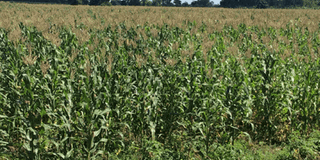Shortage of drought-resistant maize seed as farmers despair

A field of drought-resistant hybrid maize at a research station. Due to high demand and other factors, there is a shortage of seed in the market. FILE PHOTO
What you need to know:
- NaCRRI director, Dr Godfrey Asea says the hybrids commercially marketed as “TEGO” were developed to help smallholder farmers in Sub-Saharan Africa to address challenges of climate change to maize.
- The revelations by industry sources that maize seed (known as Drought TEGO or Tego—from Kiswahili for shield) is only found at one company, which planted and multiplied the seed much later than the other seed companies
- The new Tego maize hybrids were officially launched, during the annual Agriculture and Trade Show, which organised by the Uganda National Farmers’ Federation (UNFFE), in Jinja.
Newly-released drought-tolerant hybrid maize seed has reportedly run out of stock from the eight supplier-companies—except one—contracted to multiply and market it, Seeds of Gold has exclusively learnt.
The stock-out, which comes ahead of the second planting season, has raised concern across the farming community.
Farmers are also bracing themselves against any dry spells similar to the previous season, which have adversely impacted the country.
In many regions, producers are counting losses after first-season rains performed dismally, causing poor performance of maize, beans and vegetables, among other crops.
To compound the issue, the revelations by industry sources that maize seed (known as Drought TEGO or Tego—from Kiswahili for shield) is only found at one company, which planted and multiplied the seed much later than the other seed companies.
The WE2115 and WE2114 varieties are currently bulked and marketed by these companies contracted by National Agricultural Research Organisation (Naro).
TEGO is developed by Naro’s National Crops Resources Research Institute (NaCRRI) at Namulonge, under the Water Efficient Maize for Africa (Wema) project. It spanned five countries—Uganda, Kenya, Tanzania, Mozambique and South Africa.
In July, the new Tego maize hybrids were officially launched, during the annual Agriculture and Trade Show, which organised by the Uganda National Farmers’ Federation (UNFFE), in Jinja.
Sources at NaCRRI say there have been huge purchases of the seed by thousands of farmers after the country suffered losses to drought mainly in maize planted in the April–August season.
NaCRRI director, Dr. Godfrey Asea, who is Wema project’s Principal Investigator for Uganda, says if there are seed shortages in the market, it is not surprising because there is always overwhelming demand for maize seed countrywide.
“I’ve not yet heard of the shortage, but the industry being liberalised, companies must make decisions of how much seed they produce based on their economic calculations. I think that is the situation.”
However, he adds, the companies venturing into such type of seed for the first time, have faced drought challenges like the rest of the country.
“Most times they typically produce 20,000-50,000 metric tonnes of seed, but I don’t know amounts they bulked for TEGO hybrids,” Asea offered an explanation.
Naads is one of the biggest clients for seed—especially maize since it is a popular staple food and cash crop whose by-products are also significant ingredients in poultry and animal feeds.
But Grace Kazigati, a senior Naads official, points out that they do not have the hybrid maize seed on the purchase list yet. Hence, it could not be a factor that has contributed to the shortage being experienced.
She disclosed that Naads-Operations Wealth Creation (OWC) may include TEGO on next year’s first season seed.
Drought causes estimated losses of about $19.4m in Uganda, while maize earns over $51m according to a 2015 Bank of Uganda report.
On the other hand, according to Naro’s 2015 Uganda Facts and Figures Report “…. percentage of farmers growing maize is estimated at 86 [per cent]. Farmer [field] average yield is 2.7 tons per hectare compared with researcher-managed yields of 9 tons/ha.”
About the hybrid mazie varieties
According to Winnie Nanteza, the communication officer at Naro’s National Crops Resources Research Institute (NaCRRI), the TEGO varieties are conventionally-improved white maize hybrids.
They are developed with important farmer-preferred traits such as higher yields under water-stress and optimum conditions compared to drought-vulnerability, which most ordinary commercial varieties suffer.
“These hybrids also have resistance to rampant and economic losses by foliar diseases such as maize streak virus (MSV), turcicum leaf spot and gray leaf spot,” says Nanteza. “They are expected to stabilise yield under varying rainfall condition and give farmers opportunity to invest in best agronomic practices,”
On average, she added, the new hybrids yield more than three tonnes per hectare under moderate drought conditions and more than eight tonnes in optimal conditions (good rainfall conditions). They thus help farmers reduce risk and fight hunger through increased productivity.
NaCRRI director, Dr Godfrey Asea says the hybrids commercially marketed as “TEGO” were developed to help smallholder farmers in Sub-Saharan Africa to address challenges of climate change to maize.



